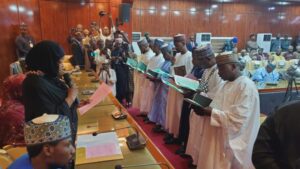


Obey court ruling on 2023 electoral offences, SERAP tells INEC
The Socio-Economic Rights and Accountability Project [SERAP] has urged the Chairman of the Independent National Electoral Commission, Professor Mahmood Yakubu, to immediately enforce the court judgment ordering INEC to prosecute cases of bribery involving state governors, their deputies, and other electoral offences committed during the 2023 general elections.
The judgment was delivered on 18 July 2024 by Justice Obiora Egwuatu, following a mandamus lawsuit brought by SERAP.
In a statement released by SERAP’s Deputy Director, obtained by newsmen on Sunday, SERAP said, “The recurring cases of electoral bribery and violence make a mockery of Nigeria’s electoral process and participatory democracy.
“The latest allegations of electoral offences in Edo State show that INEC has learned little or nothing from the well-documented problems during the 2023 general elections.”
The letter continued: “We would be grateful if the recommended measures are taken within seven days of the receipt and/or publication of this letter. If we have not heard from you by then, SERAP shall consider pursuing contempt proceedings against you and INEC for your continued failure to obey the court judgment.”
SERAP expressed concern that INEC’s ongoing failure to obey the court judgment is contributing to electoral offences in several states, as evidenced by the recently held governorship election in Edo State and the impunity for electoral offences in Nigeria.
The statement also noted that it is unacceptable for INEC to disregard the courts, which are the guardians of justice in the country. It pointed out that obeying the court judgment would go a long way towards protecting the integrity of Nigeria’s electoral and legal systems.
“Justice Egwuatu ordered INEC to seek the appointment of independent counsel to investigate allegations of electoral offences, including bribery, vote-buying, conspiracy, and undue influence against state governors and their deputies during the 2023 general elections.”
The court also directed INEC to “promptly, thoroughly, and effectively investigate reports of electoral violence and other electoral offences committed during the 2023 general elections, identify suspected perpetrators and their sponsors, and ensure their effective prosecution.”
Additionally, INEC was instructed to “swiftly prosecute all arrested electoral offenders from the 2023 general elections currently in the custody of the Nigeria Police Force, the Economic and Financial Crimes Commission, the Independent Corrupt Practices and Other Related Offences Commission, and other law enforcement agencies.”
By ignoring the court judgment, SERAP argued, INEC, under Professor Yakubu’s leadership, is violating Section 287 of the Nigerian Constitution 1999 (as amended), which imposes a binding obligation on all authorities and persons in Nigeria to comply with court verdicts.
SERAP also raised concerns about the ongoing impunity enjoyed by suspected perpetrators of electoral offences, including those involved in off-cycle governorship elections in Kogi, Imo, and Bayelsa States.
“Obeying the judgment would help prevent and combat allegations of electoral offences such as those witnessed in the recently concluded governorship election in Edo State and the deeply flawed local government elections in several states.”
“Compliance with the judgment will restore public trust and confidence in Nigeria’s electoral process. It will also ensure adherence to constitutional provisions, international standards, and the Electoral Act.”
“By immediately complying with the judgment, you will demonstrate to Nigerians that the electoral body is willing and able to end the longstanding impunity for electoral offences in the country.”
SERAP further stressed that “obeying the court judgment would reinforce the primacy of the Nigerian Constitution, the Electoral Act, and the country’s international obligations.
The immediate enforcement and implementation of the judgment by INEC would be a victory for the rule of law, and for fair, representative, and violence-free elections in Nigeria.”
Justice Egwuatu’s judgment in lawsuit number: FHC/ABJ/CS/583/2023, read in part: “As citizens of this great country, SERAP and its members have the legal interest, whose enjoyment or enforcement directly or substantially depends on the performance of public duty by INEC.”
“In requesting the performance of the public duty imposed on the electoral body, SERAP has demonstrated a great zeal for patriotism.”
“The substance of SERAP’s concern is the violence associated with elections in Nigeria, which tends to prevent citizens from exercising their franchise during elections, thus preventing credible elections and, in the long run, credible leaders.”
SERAP also emphasised that electoral violence and the associated crimes committed during elections in Nigeria pose a great challenge to the country’s democratic and economic development.
SERAP noted that it had written to INEC (vide exhibit A8), requesting, among other things, the appointment of independent counsel to investigate allegations of electoral offences, including bribery, conspiracy, and undue influence against state governors and their deputies during the 2023 general elections.
“Exhibit A8 is a distinct and clear demand for the performance of the duty made by SERAP. The electoral body, till the date of filing the action, failed to, refused to, or neglected to carry out the duty requested by SERAP.”
“There is no doubt that the Electoral Act 2022 created specific electoral offences. Sections 123, 124, 125, 126, 127, 128, and 129 of the Electoral Act detail such offences.”
The trial of offences created by the Electoral Act is to be conducted in a Magistrate’s Court or a High Court in the state where the offence was committed or in the Federal Capital Territory, Abuja (see Section 145(1) of the Electoral Act).
SERAP also noted that, by Section 145(2) of the same Act, the prosecution of these offences is to be undertaken by INEC’s legal officers or any legal practitioner appointed by INEC. Hence, the law clearly imposes on INEC the responsibility of performing this public duty.
Section 24(d) and (e) of the Nigerian Constitution 1999 (as amended) also recognises the rights of citizens to take steps to advance the community where they reside.
SERAP stressed that every citizen must make a positive and useful contribution to the advancement of the progress and well-being of the community where they reside and to assist lawful agencies in the maintenance of law and order.



